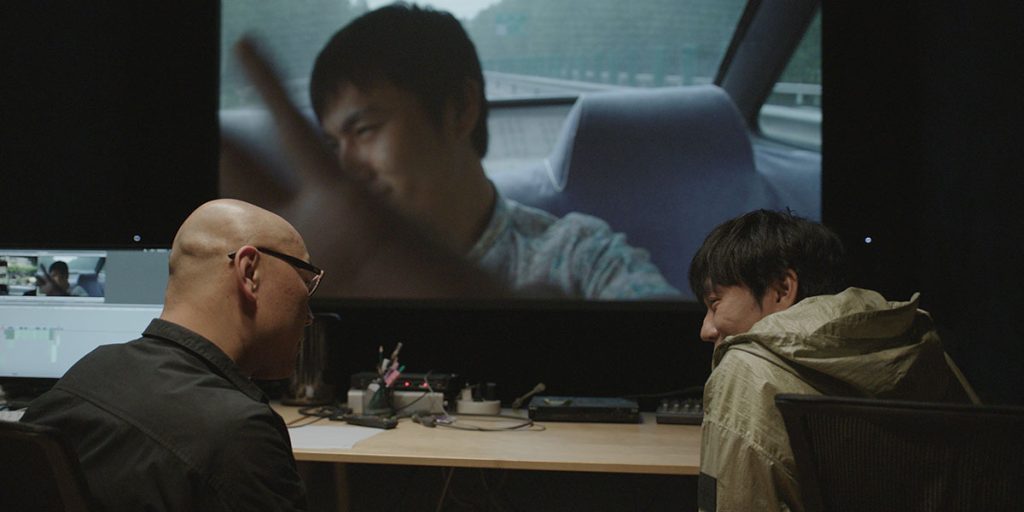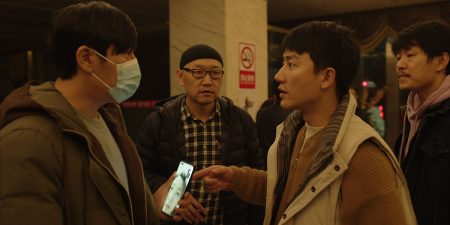
A bosom film crew’s decade-long reunion to revive a movie after funding ran dry on it coincides fatefully with the endemic onset of Covid-19 in Wuhan as they are about to wrap filming in a neighbouring city. Although the story behind Lou Ye’s eleventh feature is independent of his previous films, it is remarkable for repurposing a medley of outtakes, unused scenes, rehearsal footage and on-set documentary rushes from these past pictures—primarily Spring Fever (2009), but also Suzhou River (2000), Mystery (2012) and The Shadow Play (2018)—to play the crew’s fictional project. Fellow ‘Sixth Generation’ director Jia Zhangke also used a similar strategy in his latest film Caught by the Tides (2024), but for Lou specifically, the result is a thrifty cinematic patchwork which was heavily informed by recent events in his life: from chancing on hibernating film footage in a computer, to the desire to spin a new story from it, and finally to the search for creative ways to surmount pandemic restrictions during the making of this film. One other result of Lou cosplaying his former works this way is how An Unfinished Film reunites actors Qin Hao, Huang Xuan and Liang Ming, among others in new roles resurrected from old ones. While Lou is personified in the character of his film’s introspective director, the star of both the fictional film and Lou’s film is in fact the rascally-looking Qin, Lou’s regular actor who had appeared in most of the found footage in a variety of roles, and whose charisma had originally inspired Lou to make a film with him in the lead.
 The film opens in July 2019, when our film crew led by director Xiaorui (Mao Xiaorui) accesses a hard drive left dormant for a decade and discovers footage of a film that was abandoned due to lack of funding. Compelled to complete it, Xiaorui convinces his lead actor Jiang Cheng (Qin) and crew to make time to finish the project. The second act leaps to January 2020, three days before Chinese New Year in neighbouring Jiangxi province (likely Nanchang), where the crew is housed in a hotel to finalize scenes. News quickly filters to them that neighbouring Wuhan has been placed under hard lockdown due to worsening Covid infections. The hotel then orders a crew member from Wuhan to leave as he could be infectious, only for local authorities to then secure the hotel as a precaution. Stunned as they abandon the shoot a second time, some of the crew escape while the remainder (including Xiaorui and Jiang Cheng) is placed under sudden enforced quarantine. The final act focuses on Jiang Cheng’s solitary confinement, where Lou’s signature handheld narrative gives way to alternating split screen video call panels between his crew and distraught wife (Qi Xi), who is nursing their newborn. Crucially, in the face of everyone’s protestations, Lou shows us that the decision to lock down the hotel, however heavy-handed, was the right call because it saved Jiang Cheng from potentially infecting his family after having just interacted with a departing crew member who later collapsed from infection.
The film opens in July 2019, when our film crew led by director Xiaorui (Mao Xiaorui) accesses a hard drive left dormant for a decade and discovers footage of a film that was abandoned due to lack of funding. Compelled to complete it, Xiaorui convinces his lead actor Jiang Cheng (Qin) and crew to make time to finish the project. The second act leaps to January 2020, three days before Chinese New Year in neighbouring Jiangxi province (likely Nanchang), where the crew is housed in a hotel to finalize scenes. News quickly filters to them that neighbouring Wuhan has been placed under hard lockdown due to worsening Covid infections. The hotel then orders a crew member from Wuhan to leave as he could be infectious, only for local authorities to then secure the hotel as a precaution. Stunned as they abandon the shoot a second time, some of the crew escape while the remainder (including Xiaorui and Jiang Cheng) is placed under sudden enforced quarantine. The final act focuses on Jiang Cheng’s solitary confinement, where Lou’s signature handheld narrative gives way to alternating split screen video call panels between his crew and distraught wife (Qi Xi), who is nursing their newborn. Crucially, in the face of everyone’s protestations, Lou shows us that the decision to lock down the hotel, however heavy-handed, was the right call because it saved Jiang Cheng from potentially infecting his family after having just interacted with a departing crew member who later collapsed from infection.
The son of actors, Shanghai-born Lou graduated from the esteemed Beijing Film Academy but has mostly made films independent of China’s official film distribution system. Unsurprisingly, he has built his reputation on telling stories deemed sensitive in China. For better or for worse, Lou’s historical tangles with the China Film Administration over the content of his films and his ability to make them have been instrumental for Western tastemakers looking to position his works for audiences conditioned by decades of negative brainwashing about China. But it seems Lou cannot please everyone. In China, he has been branded an ‘online-only director’ since his films have rarely been granted licenses for theatrical distribution—though even if they were, not without a fight. All of this has led to absurd cynicism at home and abroad that Lou’s films pander to Western sensibilities or are dressed in Western robes, a familiar criticism of Asian cinemas that implies that their content is somehow inauthentic. Although Lou’s inability to secure official support at home for the kinds of stories he wants to tell means having to turn to foreign financing and distribution, this is hardly the same as being a sellout or traitor, another criticism that occasionally lands his way. After all, independent-minded artists deserve latitude to survive as respectable critics and dissenters without being defined by such spurious binaries.
One insidious consequence of Lou’s no man’s land predicament is its inevitable collision with the Western corporate media’s enduring (and of late escalating) efforts to spread anti-China propaganda to reinforce a global mainstream consensus. A typical blind spot afflicting foreign tastemakers and consumers of Mainland cinema is their inability to understand China on its own terms so that even censored Chinese filmmakers are regarded as an automatic catch, when most of the time they are not. Whether their creators like it or not, any Chinese film that is even honourably critical of China’s government and its policies is certain to have their mission spun into the popular narrative that China is repressive. Tellingly, since premiering as a special screening at the 2024 Cannes Film Festival in May, An Unfinished Film has appeared in the coverage of known Western propaganda media outlets in English and Chinese. But complicating this picture in other political ways is the film’s heightened publicity after winning Best Narrative Feature and Best Director at the 2024 Taipei Golden Horse Awards last month—Lou’s second film to win the top prize following Blind Massage (2014). The awards, which celebrate excellence in Chinese-language films, have been a flashpoint for PRC-ROC relations ever since a 2018 incident where a Taiwanese filmmaker won Best Documentary for her film about the US-backed 2014 colour revolution in Taiwan and then foolishly used her acceptance speech to advocate for Taiwan independence.
In the five years before An Unfinished Film, TIFF had programmed two other feature films thematically-centred on Covid-19 in its official selections which were also directed by Chinese filmmakers and where neither title was credited as a China production. In 2020, Chen Weixi’s, Wu Hao’s and Anonymous’ documentary 76 Days was credited as a US production, while in 2022, Wang Xiaoshuai’s The Hotel was credited as a Hong Kong production. Lou’s film is credited as a Germany-Singapore co-production.
Brandon Wee
An Unfinished Film is scheduled for theatrical release at the Film Forum in New York City on 14 March 2025.